In 356 B.C., Herostratus set fire to the Temple of Artemis.
He said he did it to immortalize his name in history.
He succeeded.
In 356 B.C., Herostratus set fire to the Temple of Artemis.
He said he did it to immortalize his name in history.
He succeeded.

I cannot help thinking that the difference which he [Matthew Arnold] makes between Washington and Lincoln is due to the fact that the one lived a century ago, and the other in our own time. A hundred years ago Englishmen would have laughed at the praise he gives to Washington. Fifty years ago they would have still considered it extravagant. To-day, they think it just. So will it be with Lincoln. Compare what was said of him in his lifetime with what is said of him even now, and we shall be able to form some idea of the verdict of the future.
— Theodore Roosevelt, commenting in Murray’s Magazine, quoted in Patrick Maxwell, Pribbles and Prabbles, 1906
Sir Walter Raleigh once made a wager with Elizabeth that he could weigh the smoke from his tobacco pipe.
When she accepted, he weighed his tobacco, smoked the pipe, and then weighed the ashes that remained.
The queen paid him. “I have seen many a man turn his gold into smoke,” she said, “but you are the first who has turned his smoke into gold.”

For stewardess Violet Jessop, bad luck came in threes. In 1911 she was working on the RMS Olympic when it collided with a British warship off the Isle of Wight.
A few months later she took a position on the Titanic, which sank famously in the North Atlantic in 1912. Her lifeboat was picked up by the Carpathia.
And in 1916 she was working as a nurse on the hospital ship Britannic when it struck a mine in the Aegean Sea and went down.
By this time she was philosophical. Though the Britannic sank in less than 50 minutes, she took care to rescue her toothbrush, “because there had always been much fun at my expense after the Titanic, when I complained of my inability to get a toothbrush on the Carpathia. I recalled [my brother’s] joking advice: ‘Never undertake another disaster without first making sure of your toothbrush.'”
After that her bad luck ceased. She lived without incident for another 55 years and died of heart failure in 1971.
In 1908, German novelist Ferdinand H. Grautoff published Banzai!, a curiously prescient account of a war between Japan and the United States. Japan deals a surprise defeat to unprepared American troops, who rally to repulse them:
Our splendid regiments could not be checked, so eager were they to push forward, and they succeeded in storming one of the enemy’s positions after the other along the mountainside. At last the enemy began to retreat, and the thunder of the cannon was again and again drowned in the frenzied cheers. General MacArthur was continually receiving at his headquarters reports of fresh victories in the front and on both wings.
Note the name of the American commander. Grautoff gives no clue to his inspiration, but in an introduction he writes, “All the incidents we had observed on the dusty highway of History, and passed by with indifference, had been sure signs of the coming catastrophe.”
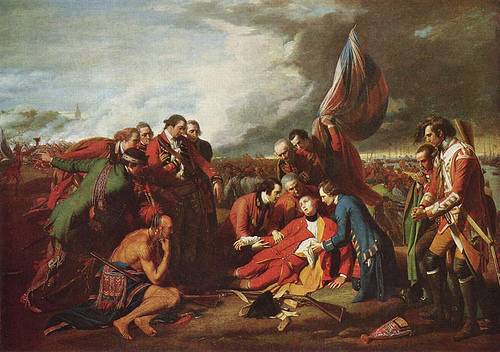
Shortly before Nelson left England for the last time, he found himself sitting next to Benjamin West at an honorary dinner. The admiral complimented the painter on his Death of Wolfe and asked why he had produced no more pictures like it.
“Because, my lord,” West said, “there are no more subjects.” He said he feared that Nelson’s fearless courage might produce another such scene, and “if it should, I shall certainly avail myself of it.”
“Will you, Mr. West?” Nelson said. “Then I hope I shall die in the next battle.”
He got his wish — West found himself painting The Death of Nelson the following year.
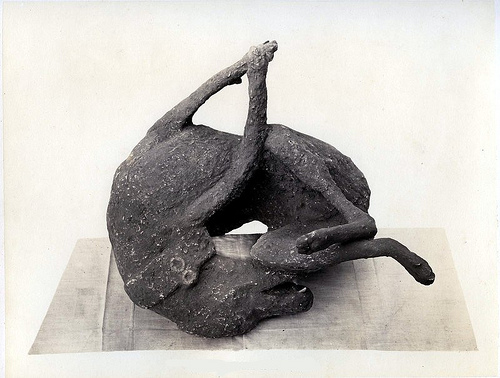
When Vesuvius erupted on Aug. 24, A.D. 79, a Roman fuller named Vesonius Primus fled toward the sea, leaving a watchdog chained to a post in the atrium of his house. It appears that the dog managed to survive the night by climbing continuously atop the mounting ash, but at dawn it reached the limit of its chain and was buried alive.
Like other victims of the eruption, its body left a vacancy in the ash layer, so a plaster cast could be made of its final position.
Writing in the New York Mercury in 1863, Robert Henry Newell noted the curious pine-board epitaph of a Union fifer at Manassas:
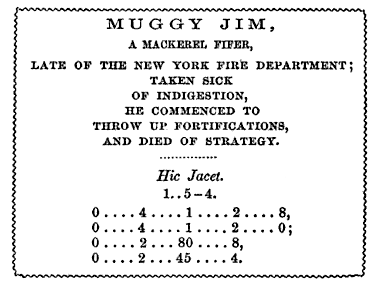
The lower portion “had to be inscribed figuratively, in order to get it all upon the narrow monument.” It means:
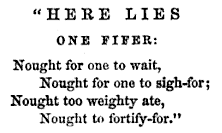
“In all its praise of that quiet sleep in which there are no anticipations to be disappointed, no gluttony to make sick, and no Confederacies to guard against,–the verse will be plain to all.”
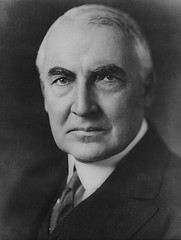
“I would like the government to do all it can to mitigate, then, in understanding, in mutuality of interest, in concern for the common good, our tasks will be solved.”
That’s Warren G. Harding, and God knows what he meant. Harding’s utterances were so impenetrable that they developed a sort of fascinated following. “He writes the worst English that I have ever encountered,” wrote H.L. Mencken, who dubbed it Gamalielese. “It is so bad that a sort of grandeur creeps into it. It drags itself out of the dark abysm of pish, and crawls insanely up the topmost pinnacle of posh. It is rumble and bumble. It is flap and doodle. It is balder and dash.”
When Harding succumbed to a stroke in 1923, E.E. Cummings wrote, “The only man, woman, or child who wrote a simple declarative sentence with seven grammatical errors is dead.”
04/08/2021 UPDATE: This example isn’t really fair to Harding — Mencken misrepresented the quote, changing a semicolon after mitigate to a comma. (Thanks, @nacreousnereid.)
The armistice that ended World War I went into effect at 11 a.m. on Nov. 11 (“the 11th of the 11th of the 11th”) in 1918.
Gordon Brook-Shepherd writes: “[A]ny firing still going on ended on the last second of the tenth hour, sometimes with droll little ceremonies — as on the British front near Mons, where [a] German machine-gunner blazed off his last belt of ammunition during the last minute of the war and then, as the hour struck, stood up on his parapet, removed his steel helmet, bowed politely to what was now the ex-enemy opposite, and disappeared.”
The last casualties were not so droll. At 10:45 a.m., French soldier Augustin Trébuchon was running to tell his friends that hot soup would be served after the ceasefire when he was shot and killed.
And in the Forest of Argonne, American private Henry Gunther charged a German position just before 11:00 and was shot down. He died 60 seconds before the end of the war.